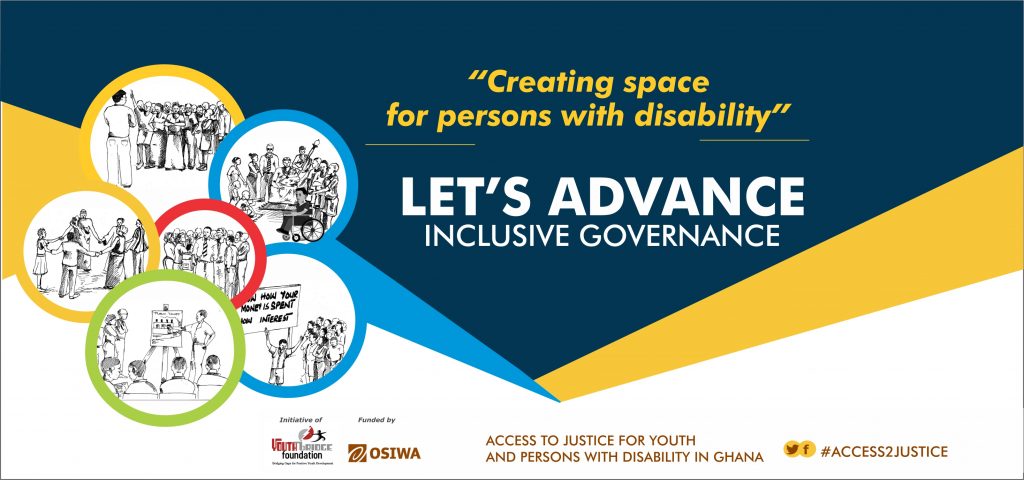
Government Urged To Implement Extensive Provision For PWDS In Article 29 And 37 Of The 1992 Constitution
In line with the “ACCESS TO JUSTICE for Youth and Persons with Disability in Ghana” Project, implemented by Youth Bridge Foundation (YBF) with support from the Open Society Initiative of West Africa (OSIWA), the YBF on the occasion of this year’s International Day of Persons with Disabilities (IDPD), calls on government to Implement the extensive provision for Persons with Disability in Article 29 and 37 of the 1992 Constitution and Person’s with Disability (PWDs) Act, 2006 (Act 715).
A statement signed by Ms Esther Yayra Attipoe, the Legal and Advocacy Manager of YBF, and issued in Accra on Monday said: “The passage of the PWD Act, 2006 (Act 715) is considered a noteworthy milestone in Ghana’s human rights discourse because it gives hope that will improve the lives of PWDs to enable them be part of mainstream society.
“Though the Act covers key thematic provisions such as rights, accessibility, employment and education for PWDs amongst others, it has been criticized on the grounds that it has no provision on non-discrimination, the gender dimension of discrimination, rights of children with disability and legal definition of disability,” it said.
The statement stated that, to promote the well-being of PWDs a concerted stakeholder discussion in the event that policy actors decide to amend the Act is laudable adding that; “This is not to conclude that addressing these challenges and omissions will put an end to the scores of challenges confronting PWDs in Ghana but rather to ensure that Act 715 becomes robust and responsive to the needs and concerns of PWDs.
“According to the 2010 population census, slight or visual impairment accounted for 40.1 per cent of disabilities, physical disability (25.4 per cent) speech impairment accounted for the lowest percentage (13.7 per cent), whilst age distribution 15-19 years and 55-59 years constitute 6.9 per cent and 4.7 per cent respectively, 65 years and above age group accounts for the highest percentage (22.2 per cent) conferring to the statistics of the marital status of persons with disability four out of ten persons aged 12 years and older with disability are married and 27.3 per cent are never married, 47 per cent of males and 34.4 per cent of females are married, also the percentage of persons with disability who get married in the rural areas is higher than that of those in the urban areas for instance, 49 per cent of males in rural areas are married compared to 44.3 per cent of the urban resident. The educational level of person’s with disability is quite disheartening. 4 in 10 aged 3 years and older have no formal education whilst 17.4% have primary school education. 58.3 per cent of females with disability in the rural areas have no formal education whilst 40.7 per cent of males have no formal education,” it said.
The statement also noted that according to an August, 2016, Global Accessibility News article, 90 per cent of public buildings is not accessible to persons with disabilities in Ghana and that less than 10 per cent of all public buildings in Ghana are accessible for persons with disabilities.
The statement also called for support towards the implementation of the provisions in the Children’s Act, 1998 (ACT 560) particularly sections 3 and 10. As well as Section 48 of the Local Governance Act, 2016 (act 936).
This, the statement quoted the Legal and Advocacy Manager of YBF, Ms Attipoe as saying; “That is why YBF with the support of OSIWA in its on-going “ACCESS TO JUSTICE for Youth and Persons with Disability in Ghana” Project, is championing the rights of PWDs and children in the country by educating children, teachers, parents and communities on the basic fundamental laws that protects and broaden their knowledge on their dos and don’ts as citizens,” it said.
According to the statement, the formulation of policies and programmes that are consistent with international laws and conventions such as the African Charter on the Rights and Welfare of the Child; the African Charter on Human and People’s Rights; the World Programme of Action ‘WPA’ concerning Disabled Persons; and the International Convention on the Rights of Persons with Disabilities was timely in Ghana and that is the best gift leaders can give PWDs on the commemoration of IDPD on the theme: “Empowering Persons with Disabilities and Ensuring Inclusiveness and Equality.”
Since 1992, the United Nations (UN) IDPD has been annually observed on 3 December around the world.
The observance of the Day aims to promote an understanding of disability issues and mobilize support for the dignity, rights and well-being of persons with disabilities.
This theme focuses on the empowering of persons with disabilities for the inclusive, equitable and sustainable development envisaged in the 2030 Agenda for Sustainable Development.
The 2030 Agenda, pledging to “leave no one behind,” is an ambitious plan of action of the international community towards a peaceful and prosperous world, where dignity of an individual person and equality among all is applied as the fundamental principle, cutting across the three pillars of the work of the United Nations: Development, Human Rights and Peace and Security. It is critical to ensure, in this regard, the full and equal participation of persons with disabilities in all spheres of society and create enabling environments by, for and with persons with disabilities.
The annual observance of the IDPD was proclaimed in 1992, by the UN General Assembly resolution 47/3.
YBF is a non-governmental youth focused educational organisation that has the goal of bridging gaps for positive youth development.
It is accredited with the United Nations Economic and Social Council (ECOSOC) Special Consultative Status.
BY YBF COMMUNICATIONS DEPARTMENT
